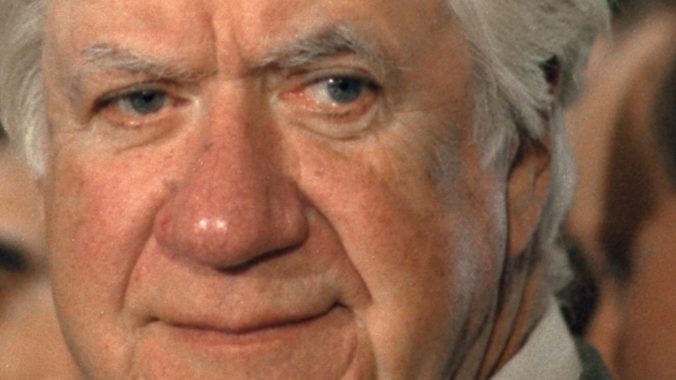Thomas Phillip, Jr. (Tip) O’Neill (1912-1994) – House Speaker, Democratic Whip & Majority Leader From Massachusetts
LISTEN ON SOUNDCLOUD:
As noted in the Daniel Patrick Moynihan column in this series, the press and media are full of reports of extreme partisanship and acrimony in Congress and with the White House in recent times. But not that long ago, the parties at least appeared to work together to solve national problems regardless of party affiliations. Like Moynihan, Thomas Phillip (Tip) O’Neill was one of those who was able to work with the other side at least when it came to foreign affairs.
Early Life and Career
Tip was born on December 9, 1912, to Thomas Phillip O’Neill, Sr. and Rose Ann (nee Tolan), in North Cambridge, Massachusetts. His mom died when he was nine months old and his father was a bricklayer who became Superintendent of Sewers. Tip’s nickname came from a Canadian baseball player whose last name was O’Neill and whose nickname was “Tip.” Tip graduated from Boston College in 1936. Tip ran for a seat on the Cambridge City council as a college senior, the only election he ever lost. It was from that campaign that he learned the lesson that would become his most famous quote- “All politics is local.”
Fresh from Boston College, Tip ran for and won election to the Massachusetts House of Representatives. Tip became the Minority Leader of the Massachusetts House from 1947 to 1949 and was Speaker of the Massachusetts House from 1949 to 1953, becoming the first Democratic Speaker in Massachusetts’ history.
National Politics
Tip ran for the United States House of Representatives vacated by John F. Kennedy in 1952 when Kennedy ran for the Senate. He won and was re-elected 16 more times. During his second term in the House, he was selected to the House Rules Committee. Tip bucked President Lyndon B. Johnson’s support of the Vietnam War, coming out opposed to the United States intervention.
Tip was elected House Majority Whip in 1971 and, in 1973, was elected House Majority Leader. In that role, he called for the impeachment of President Richard M. Nixon. A scandal in the House caused the then-Speaker, Carl Albert, to retire, and Tip was elected Speaker in 1977. He would hold that position for the next ten years, until he retired from Congress on January 3, 1987.
Tip was a proponent of universal health care and tackling jobs and poverty. When Jimmy Carter became President in 1977, expectations were that there would be much accomplished. However, while President Carter was focused on reducing government spending, Tip had other ideas as Speaker, including rewarding party members. When Ronald Reagan became president, Tip and the new president collapsed, and the Senate had shifted to a Republican majority. Tip called President Reagan “the most ignorant man who had ever occupied the White House” and was otherwise very critical of President Reagan. Despite the public vitriol, the two were always on friendly terms. In one interview, President Reagan mentioned that he had seen Tip make unflattering comments about Reagan. Reagan called Tip to ask why the attacks, that he thought these two were friends. Tip is reported to have replied, “Buddy, it is just politics. After 6 p.m. we are friends.” After a visit between the two early in Reagan’s first term, the two were able to navigate social security reform and a tax reform plan and other legislation.
When it came to foreign affairs and our involvement in the Soviet-Afghan war, Tip gave his approval and through his House positions ensured that billions went to the Mujahideen. When Reagan was shot, Secretary of State Alexander Haig asserted he was in charge, O’Neill was the next in line after Vice President George H.W. Bush.
Tip was also very involved in the peace efforts in Northern Ireland. He and several other congressional leaders helped to achieve peace between Northern Ireland and England. Tip died on January 5, 1994, of cardiac arrest. His wife of many years, Mildred “Millie” Anne Miller, outlived him by almost a decade. President Bill Clinton said of Tip at his death:
“Tip O’Neill was the nation’s most prominent, powerful and loyal champion of working people…”
Conclusion
While Tip and Reagan had different political views and approaches, they showed that great debates and the efforts of compromise sometimes can result in good end results for the nation. Tip is the third longest serving Speaker in United States House history and was a strong “New Deal Democrat” who believed strongly that through public service he truly could positively affect the lives of working people.
Dan Cotter is a partner at Latimer LeVay Fyock LLC and an adjunct professor at The John Marshall Law School, where he teaches SCOTUS Judicial Biographies. He is in the process of writing a book on the seventeen Chief Justices. He is also a past president of The Chicago Bar Association. The article contains his opinions and is not to be attributed to anyone else.
Click Here to have the NEWEST essay in this study emailed to your inbox every day at 12:30 pm Eastern!
Click Here for the previous essay.
Click Here for the next essay.
Click Here to view the schedule of topics in our 90 Day Study on Congress.




I remember Tip. I agree with the essayist that great debates and disagreements do not prevent compromise, progress, and good for the nation. Indeed compromise in the face of debate likely produces much better results for the nation than the recent trend of majority rule forcing everything they want onto the opponents.
PSD